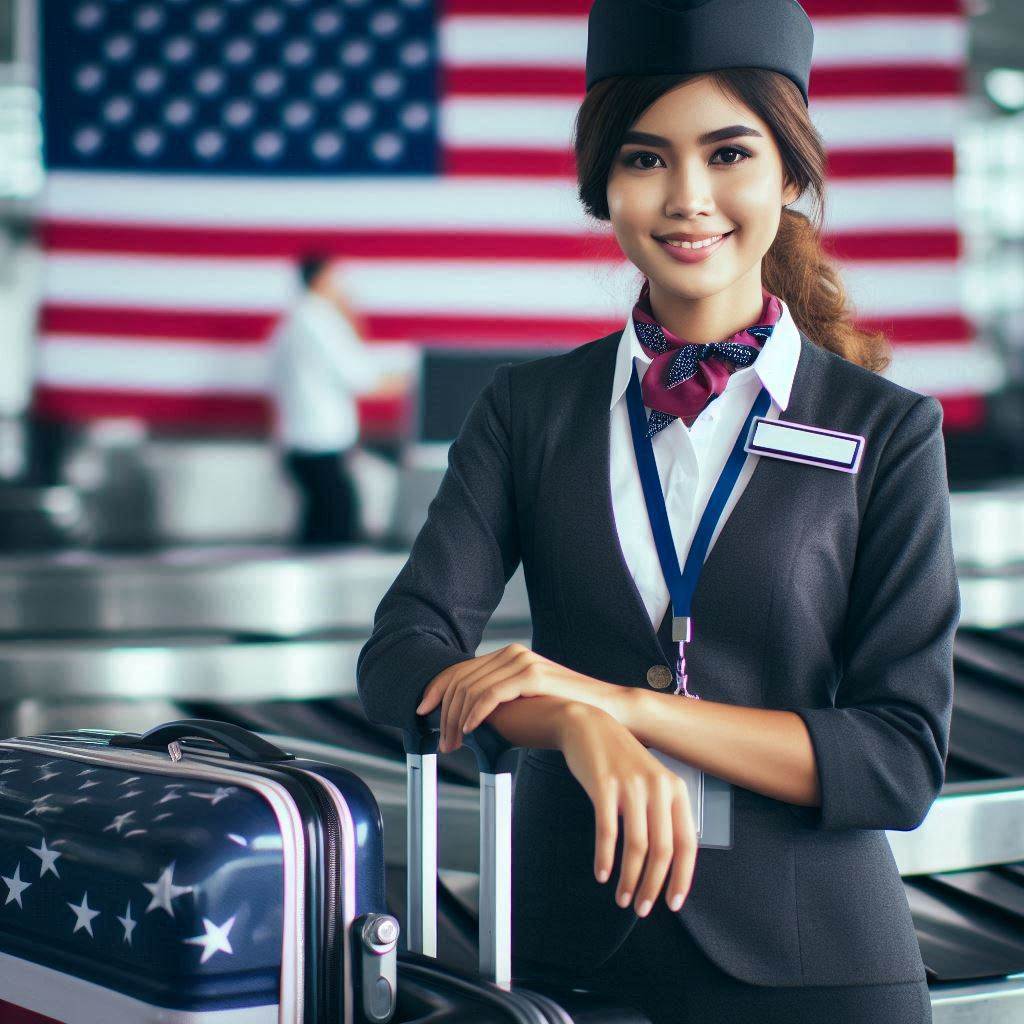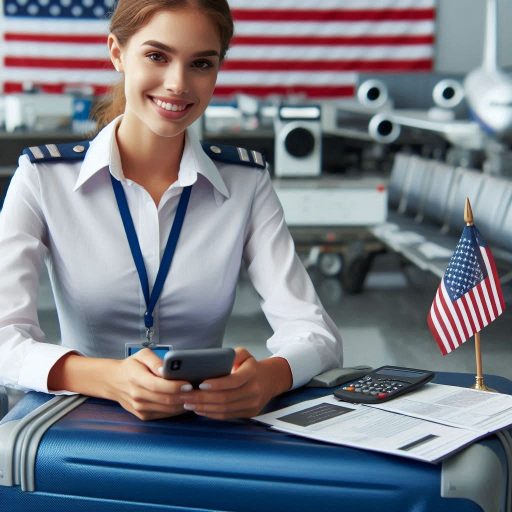Introduction
Baggage handlers are responsible for loading and unloading luggage onto aircraft.
They play a vital role in ensuring smooth operations in the transportation industry.
Daily Tasks and Responsibilities
- Baggage handlers must carefully handle passengers’ luggage to prevent damage.
- They need to follow strict safety protocols when lifting and transporting heavy bags.
- Baggage handlers must be able to work quickly and efficiently to ensure on-time departures.
- They are responsible for sorting luggage according to destination and flight number.
- Baggage handlers often work in harsh weather conditions, requiring physical stamina.
- They communicate effectively with other team members to coordinate baggage handling activities.
- Baggage handlers may also operate various equipment such as conveyor belts and tugs.
- They are trained to identify and report any suspicious or unattended bags to security.
- Baggage handlers need to maintain a clean and organized work environment for efficiency.
- They play a crucial role in providing a positive customer experience by handling baggage professionally.
In a nutshell, baggage handlers are essential for the smooth operation of the transportation industry.
Their daily tasks and responsibilities require physical endurance, attention to detail, and strong teamwork skills to ensure that passengers’ luggage reaches its destination safely and on time.
Preparing for the shift
Checking schedule and assignments
Baggage handlers typically start their day by checking their schedule and assignments for the shift.
This helps them plan their tasks accordingly and ensure they are aware of any specific instructions or requirements for the day.
Gathering necessary equipment and supplies
Before starting their shift, baggage handlers need to gather all the necessary equipment and supplies they will need to perform their duties.
This may include carts, dollies, tags, and other tools needed to transport and organize luggage.
Reporting to designated work area
Once baggage handlers have checked their schedule and gathered their equipment, they report to their designated work area.
This can be the baggage claim area, the tarmac, or a specific gate where they will be assisting with loading and unloading luggage.
Handling incoming luggage
Unloading luggage from arriving flights
Baggage handlers are responsible for unloading luggage from arriving flights.
They carefully remove the bags from the cargo hold, ensuring they are not damaged during the process.
Sorting and organizing luggage
After unloading the luggage, baggage handlers sort and organize the bags based on their destination.
They use tags and scanners to identify each piece of luggage and ensure it is placed in the correct location for pickup by passengers or transfer to connecting flights.
Transporting luggage to the baggage claim area
Once the luggage is sorted and organized, baggage handlers transport it to the baggage claim area.
They use carts or dollies to move large quantities of luggage efficiently and quickly to the designated pickup area for passengers.
Loading luggage onto departing flights
Receiving luggage from passengers
Before loading luggage onto departing flights, baggage handlers receive bags from passengers at the check-in counter or curbside check-in.
They ensure that each bag is properly tagged and scanned before loading it onto the aircraft.
Loading luggage onto the conveyor belt
Baggage handlers load the luggage onto the conveyor belt, which transfers it to the aircraft.
They must ensure that the bags are properly stacked and secured to prevent shifting during the flight.
Securing luggage in the cargo hold
Once the bags are loaded onto the aircraft, baggage handlers secure them in the cargo hold.
They use straps and nets to prevent the bags from moving during takeoff, landing, and turbulence, ensuring that the luggage arrives safely at its destination.
Communicating with coworkers and supervisors
Coordinating with other baggage handlers
Baggage handlers need to communicate and coordinate with their coworkers to ensure a smooth operation.
They work together to unload, sort, and load luggage efficiently, making sure that all tasks are completed on time.
Reporting any issues or concerns to supervisors
If baggage handlers encounter any problems or have concerns during their shift, they must report them to their supervisors.
This can include damaged luggage, missing tags, or delays in the loading process that may affect the departure of the flight.
Following safety protocols and procedures
Baggage handlers must adhere to strict safety protocols and procedures to prevent accidents and injuries.
They receive training on how to lift heavy bags properly, operate equipment safely, and handle hazardous materials in compliance with airport regulations.
Read: How to Create a Pet-Friendly Grooming Environment
Loading and Unloading Luggage
A baggage handler plays a crucial role in the smooth operations of an airport.
They are responsible for efficiently loading and unloading luggage onto and from aircraft, ensuring that each bag reaches its correct destination.
Identifying and Handling Different Types of Baggage
- Baggage handlers must be able to identify various types of luggage, including suitcases, bags, and oversized items.
- They need to handle fragile items with care, ensuring that delicate belongings are appropriately secured for transport.
- Properly identifying and handling luggage reduces the risk of damage during loading and unloading processes.
Loading Luggage onto Conveyors and into Aircraft Holds
- Baggage handlers are responsible for loading luggage onto conveyor belts that transport bags to the aircraft.
- They must be efficient in stacking and arranging luggage in a way that maximizes space and prevents shifting during travel.
- Once the bags reach the aircraft hold, handlers carefully load each piece to ensure a secure fit.
Ensuring Proper Distribution for Balance and Weight
- One critical aspect of a baggage handler’s job is to ensure that luggage is distributed evenly for balance and weight considerations.
- By strategically placing bags throughout the aircraft hold, handlers help maintain stability during flight.
- They must adhere to specific guidelines to prevent overloading or uneven weight distribution, which can affect the aircraft’s performance.
Overall, loading and unloading luggage is a meticulous task that requires attention to detail and efficiency.
Baggage handlers play a vital role in ensuring that passengers’ belongings are safely transported to their destinations.
Read: Nail Technician Networking: Building Industry Connections
Handling special items
When it comes to handling special items as a baggage handler, there are several important tasks and responsibilities that must be carried out with precision and care.
Recognizing and properly handling fragile or valuable items
- Inspecting for fragile stickers or labels on bags.
- Using caution when loading and unloading delicate items.
- Communicating with coworkers about fragile items in the luggage.
- Ensuring fragile items are placed on top or in a separate area.
Assisting with oversized or irregular-shaped luggage
- Using appropriate equipment or tools for heavy items.
- Working together with colleagues to lift and move large bags.
- Communicating with passengers about oversized baggage fees.
- Notifying supervisors of any issues with irregular-shaped items.
Following special procedures for live animals or hazardous materials
- Reviewing airline guidelines for transporting live animals.
- Handling animals with care and following proper protocols.
- Using designated containers for hazardous materials.
- Alerting authorities if there are any concerns about hazardous items.
Overall, handling special items as a baggage handler requires attention to detail, communication with team members.
Adherence to safety protocols to ensure the smooth transport of luggage and special cargo.
Transform Your Career Today
Unlock a personalized career strategy that drives real results. Get tailored advice and a roadmap designed just for you.
Start NowRead: The Role of Technology in Modern Pet Grooming

Communicating with team members
Working Closely with Fellow Baggage Handlers and Ground Crew
Handlers begin their shifts with a team briefing.
They discuss the day’s flight schedule and share important updates.
Each team member needs to know their responsibilities.
Clear communication prevents misunderstandings and mistakes.
Handlers often collaborate with fellow baggage handlers during busy times.
They rely on each other to manage the flow of luggage effectively.
If one handler needs assistance, they quickly signal their teammate.
This teamwork fosters a supportive environment and enhances overall performance.
Communicating Aircraft Specifications and Loading Instructions
Handlers must understand aircraft specifications and loading instructions.
Different aircraft have specific requirements for weight and balance.
Baggage handlers receive these details from ground crew members.
They must follow these instructions carefully to maintain safety and efficiency.
A miscommunication can lead to serious issues during takeoff or landing.
Handlers communicate frequently with ground crew about loading processes.
They confirm which bags need priority and which can wait.
This clarity ensures that every piece of luggage reaches its destination on time.
Knowing the specifications for each flight is crucial for smooth operations.
Coordinating Efforts to Ensure Efficient Handling of Luggage
Coordinating efforts among team members enhances the efficiency of luggage handling.
Baggage handlers communicate using hand signals and radios.
These tools help relay instructions quickly and clearly.
For instance, when one handler needs assistance, they signal for help.
This prompt communication keeps operations flowing smoothly.
During busy periods, effective communication becomes even more critical.
Handlers often work under pressure to meet tight deadlines.
They rely on their teammates to keep track of incoming and outgoing luggage.
Timely communication helps everyone stay on the same page.
It also minimizes the risk of delays.
Handlers also coordinate with other ground crew members, such as ramp agents.
These agents load and unload baggage from the aircraft.
They need to know which bags go on which flights.
Clear communication helps prevent misplaced luggage.
Each handler must accurately relay the information to ensure proper loading.
Furthermore, team communication extends to safety protocols.
Handlers must be aware of safety guidelines and emergency procedures.
They communicate any safety concerns immediately.
This vigilance protects both team members and passengers.
In fact, communication among baggage handlers and ground crew members plays a crucial role in operations.
Team members rely on clear and concise communication for efficient luggage handling.
By staying connected and coordinating efforts, handlers can ensure a seamless experience for all travelers.
Effective teamwork enhances safety, efficiency, and overall performance at the airport.
Read: Customer Service Tips for Pet Grooming Professionals
Ensuring safety and security
Adhering to Safety Protocols for Lifting and Handling Baggage
One critical aspect of a baggage handler’s job is safely lifting and handling baggage.
They follow strict guidelines to avoid injury while managing heavy or awkward items.
Proper lifting techniques are crucial, including bending the knees and keeping the back straight.
These methods help protect both the worker and the luggage.
Mishandling baggage can lead to personal injury and damage to the passenger’s property.
Using equipment like conveyor belts or carts can reduce physical strain and improve efficiency.
Handlers must stay alert and aware of their surroundings when moving luggage to avoid collisions or accidents.
Inspecting Luggage for Security Risks or Suspicious Items
In addition to handling luggage, baggage handlers inspect items for potential security threats.
This involves watching for unusual shapes, smells, or sounds from the luggage.
Any signs of tampering or suspicious contents require immediate attention.
Although baggage screening systems aid in detecting prohibited items, human observation remains crucial.
Handlers may find things overlooked by automated systems, such as liquids, sharp objects, or explosives.
Their diligence helps prevent dangerous items from reaching the plane.
If they notice anything out of the ordinary, they must notify security personnel immediately.
Reporting Any Safety Hazards or Security Concerns
Baggage handlers are responsible for identifying and reporting safety hazards in the working environment.
They keep a watchful eye for things like faulty equipment, spills, or obstructions on the tarmac.
Such hazards can create dangerous situations for handlers, airport staff, or passengers.
It’s crucial to report these issues immediately to prevent accidents or delays.
Additionally, handlers must report any suspicious activities or unattended baggage in the area.
Security concerns must be addressed swiftly to avoid potential threats.
Regular safety checks and communication with airport personnel are essential to maintaining a secure environment.
By staying proactive, baggage handlers help maintain the overall safety of the airport and its passengers.
In short, ensuring safety and security is a core responsibility for baggage handlers.
Their attention to safety protocols, vigilance in identifying security risks, and quick reporting of hazards contribute significantly to the safe operation of airports.
Maintaining these standards ensures that the travel experience remains secure and efficient for all.
Providing customer service
As a baggage handler, providing exceptional customer service is a crucial aspect of the job.
Passengers rely on baggage handlers to ensure that their luggage arrives safely at their destination.
Here are some of the daily tasks and responsibilities related to providing customer service:
Assisting passengers with locating and retrieving luggage
One of the primary responsibilities of a baggage handler is to assist passengers with locating and retrieving their luggage.
This involves helping passengers identify their bags on the carousel and providing any necessary assistance in lifting or carrying heavy items.
Baggage handlers must be courteous and helpful in their interactions with passengers to ensure a positive customer experience.
Addressing any concerns or complaints related to baggage handling
In the event that a passenger has a concern or complaint related to their baggage handling experience, it is the responsibility of the baggage handler to address these issues promptly and professionally.
This may involve investigating the issue, communicating with the passenger to understand their perspective, and working to resolve the problem to the best of their ability.
By addressing concerns effectively, baggage handlers can help to mitigate any negative experiences and maintain positive relationships with passengers.
Representing the airline or transportation company in a professional manner
Baggage handlers serve as ambassadors for the airline or transportation company they work for and must represent the organization in a professional and courteous manner.
This includes interacting with passengers in a friendly and helpful way, adhering to company policies and procedures, and maintaining a clean and organized work environment.
By embodying the values and standards of the company, baggage handlers play a key role in shaping the overall impression that passengers have of the airline or transportation provider.
In short, providing exceptional customer service is an essential part of a baggage handler’s daily tasks and responsibilities.
By assisting passengers with locating and retrieving luggage, addressing concerns or complaints related to baggage handling.
Representing the airline or transportation company in a professional manner.
Baggage handlers contribute to a positive customer experience and help to ensure that passengers have a smooth and enjoyable travel experience.
Conclusion
baggage handlers play a vital role in the travel industry.
Their daily tasks involve managing luggage from check-in to delivery at the carousel.
Each day, they load and unload bags from planes, ensuring safe handling.
They also track baggage and assist with any misplaced items.
Baggage handlers work efficiently under pressure, often in challenging weather conditions.
They collaborate closely with ground crew and airline staff to meet tight schedules.
Each task requires attention to detail to prevent damages and delays.
Their dedication ensures that travelers receive their luggage promptly and intact.
The hard work of baggage handlers often goes unnoticed.
Many passengers overlook the effort it takes to move their belongings safely.
Yet, without these skilled workers, travel would become chaotic and stressful.
Their commitment to excellence ensures that every flight runs smoothly.
Baggage handlers also face physical demands.
They lift heavy bags, navigate crowded airports, and stay alert during long shifts.
This physicality requires strength and stamina, showcasing their dedication to the job.
Their resilience contributes significantly to the overall travel experience.
Moreover, baggage handlers maintain safety standards at all times.
They follow strict protocols to prevent accidents and injuries.
This focus on safety ensures that both workers and travelers remain protected.
Their diligence upholds the airport’s reputation for reliability and efficiency.
As we reflect on their responsibilities, it’s clear that baggage handlers are unsung heroes.
They enable a seamless transition for passengers from check-in to arrival.
Their behind-the-scenes efforts directly impact the travel experience.
Travelers often express gratitude for smooth journeys.
However, they may not realize the extent of baggage handlers’ contributions.
These professionals work tirelessly to ensure that everything runs like clockwork.
Their role is crucial in creating positive travel memories for everyone.




